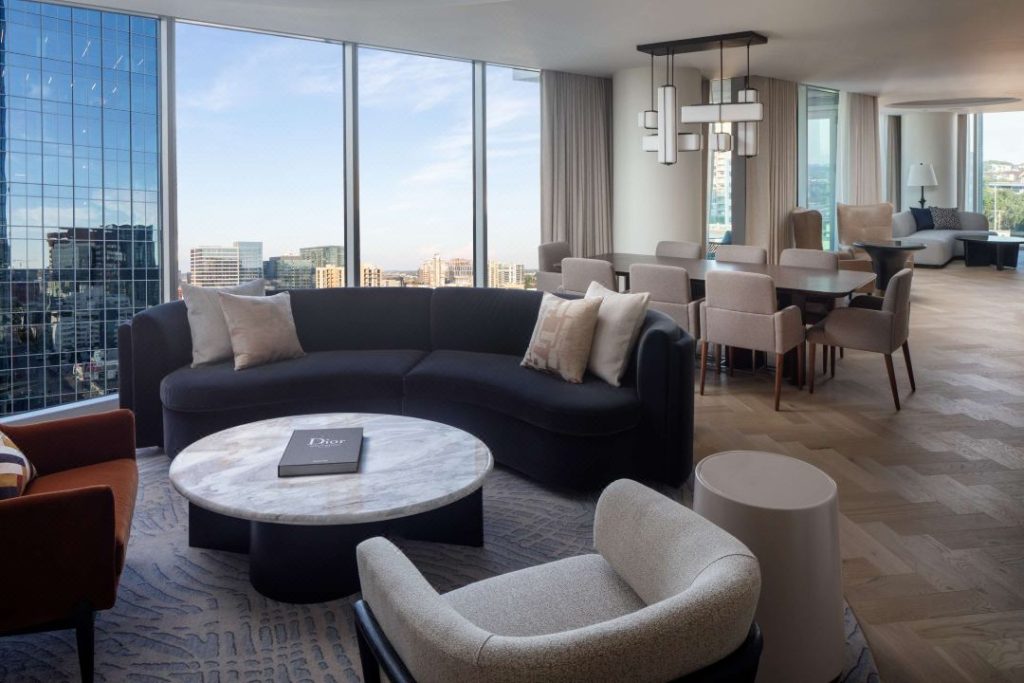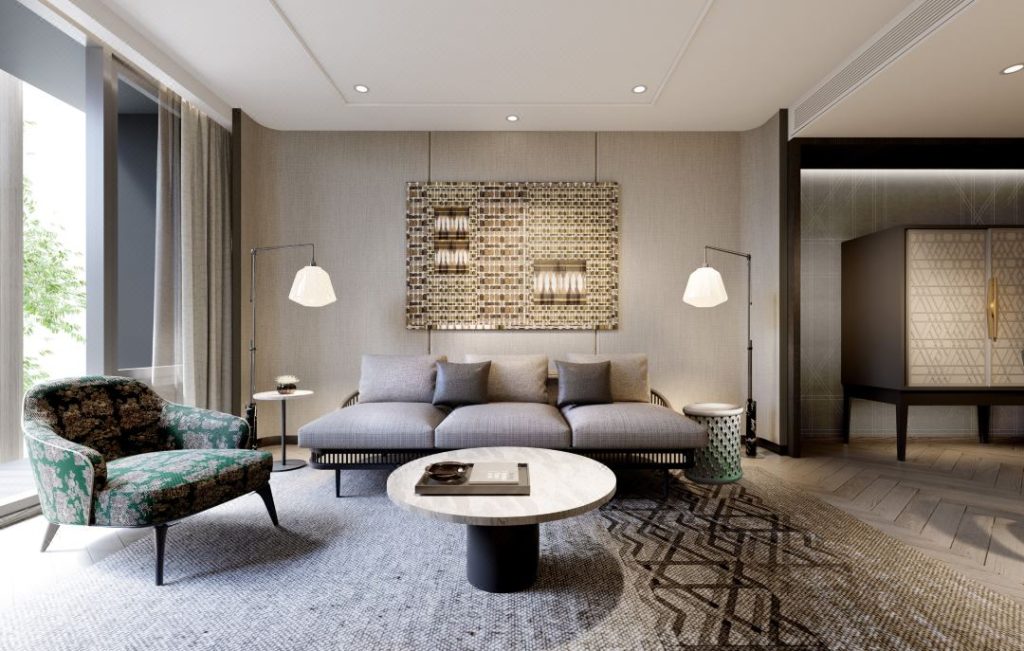Greetings from Harman. We welcome you to the world of hospitality furniture, where comfort, functionality, and design converge to create memorable guest experiences. From luxurious hotel lobbies to cozy restaurant settings, the furniture in hospitality spaces plays a pivotal role in shaping the ambiance and atmosphere that guests encounter during their stay.
In this article, we’ll delve into the intricate world of hospitality furniture, exploring its significance in the industry, the latest design trends shaping its evolution, and the key considerations involved in selecting the perfect pieces to elevate guest experiences to new heights. Join us on a journey as we take a deep dive into the world of hospitality furniture and discover how it transforms spaces into inviting havens for travelers around the globe.

Introduction to Hospitality Furniture:
Hospitality furniture forms the backbone of the guest experience in hotels, restaurants, resorts, and other hospitality establishments. It encompasses a wide range of furniture pieces, including seating, tables, beds, lighting fixtures, and decorative accents, all carefully curated to create inviting and functional spaces for guests to relax, dine, work, and socialize.
Beyond mere utility, hospitality furniture plays a crucial role in shaping the ambiance, atmosphere, and overall impression that guests take away from their stay. Whether it’s the sleek sophistication of a boutique hotel lobby or the rustic charm of a countryside inn, the design, and selection of furniture are fundamental in defining the character and identity of a hospitality venue.
The Importance of Furniture in the Hospitality Industry and the Role of Hospitality Furniture Suppliers:
Furniture is a cornerstone of the hospitality industry, influencing everything from guest comfort and convenience to brand perception and profitability. In hotels, comfortable and stylish furnishings in guest rooms, lobbies, and public areas can make a lasting impression on guests, influencing their overall satisfaction and likelihood of returning in the future.
Similarly, in restaurants and bars, well-designed furniture sets the stage for memorable dining experiences, enhancing comfort, ambiance, and functionality. As such, hospitality businesses recognize the importance of investing in high-quality furniture that not only meets their aesthetic and functional requirements but also aligns with their brand identity and target clientele.
This is where hospitality furniture suppliers play a crucial role. By partnering with reputable suppliers who specialize in hospitality furniture, businesses can access a wide range of options tailored to their specific needs and preferences. These suppliers understand the unique demands of the hospitality industry, from the need for durable and easy-to-maintain materials to the importance of timely delivery and installation. They work closely with clients to assess their requirements, recommend suitable furniture solutions, and ensure seamless integration into their space.
Moreover, hospitality furniture suppliers stay abreast of the latest design trends, technological innovations, and sustainability practices, enabling them to offer cutting-edge solutions that enhance the guest experience and differentiate their clients’ businesses in a competitive market.

Whether it’s sourcing eco-friendly materials, incorporating smart technology features, or customizing furniture pieces to match a particular design aesthetic, hospitality furniture suppliers play a pivotal role in helping hospitality businesses create inviting and memorable spaces that leave a lasting impression on guests.
Design Trends Shaping Hospitality Furniture:
In the ever-evolving landscape of hospitality design, furniture trends play a significant role in shaping the look and feel of hospitality spaces. From timeless classics to contemporary innovations, design trends in hospitality furniture reflect evolving guest preferences, technological advancements, and broader societal shifts.
One prevalent trend is the fusion of comfort and style, with an emphasis on creating spaces that feel both inviting and visually striking. This often involves the use of plush upholstery, ergonomic designs, and warm, inviting color palettes to enhance guest comfort and promote relaxation.
Another notable trend is the incorporation of sustainable materials and practices in hospitality furniture design. With increasing awareness of environmental issues and a growing demand for eco-friendly products, hospitality businesses are turning to sustainable furniture options that minimize environmental impact without compromising on quality or aesthetics.
This may include the use of reclaimed wood, recycled plastics, and low-emission finishes, as well as innovative manufacturing processes that reduce waste and energy consumption.
Furthermore, customization and personalization are becoming increasingly important in hospitality furniture design, as businesses seek to create unique and memorable guest experiences. Whether it’s through bespoke furniture pieces, customizable finishes, or modular designs that can be adapted to different spaces and functions, customization allows hospitality businesses to express their brand identity and create spaces that resonate with their target audience.

Functionality and Comfort; Balancing Act in Hospitality Furniture:
In the realm of hospitality furniture, achieving the perfect balance between functionality and comfort is paramount. Hospitality spaces are multifaceted environments where guests expect both practicality and relaxation. Furniture must not only fulfill its intended purpose but also provide a comfortable and inviting experience for guests.
Whether it’s a hotel lobby, restaurant dining area, or outdoor patio, each piece of furniture should be carefully selected and positioned to maximize functionality without compromising on comfort.
This balancing act requires careful consideration of factors such as ergonomics, space optimization, and ease of use. Additionally, the choice of materials and construction techniques can significantly impact both the functionality and comfort of hospitality furniture, with options ranging from durable yet plush upholstery to weather-resistant and easy-to-clean finishes.
By prioritizing functionality and comfort in furniture selection and arrangement, hospitality businesses can create spaces that not only meet the practical needs of guests but also provide a welcoming and enjoyable environment for them to relax and socialize.
Sustainable Practices in Hospitality Furniture Design:
As sustainability becomes an increasingly pressing concern in the hospitality industry, the adoption of sustainable practices in furniture design has gained momentum. Hospitality businesses are recognizing the importance of reducing their environmental footprint and are seeking out furniture solutions that minimize waste, conserve resources, and promote eco-friendly manufacturing processes.

Sustainable hospitality furniture design encompasses various aspects, including the use of responsibly sourced materials, such as FSC-certified wood and recycled metals, as well as the implementation of energy-efficient production methods and waste reduction strategies. Additionally, sustainable furniture design extends to the entire lifecycle of furniture, from its initial production to its eventual disposal or recycling.
By embracing sustainable practices in hospitality furniture design, businesses can not only minimize their environmental impact but also appeal to environmentally conscious guests who prioritize sustainability in their travel choices.
Customization and Personalization in Hospitality Furniture:
In an era of heightened consumer expectations and personalized experiences, customization and personalization have emerged as key trends in hospitality furniture design. Hospitality businesses are increasingly seeking out furniture solutions that allow them to tailor their spaces to the unique preferences and needs of their guests. Customization options may include the ability to select specific materials, finishes, colors, and configurations to match the branding and design aesthetic of the establishment. Furthermore, personalization goes beyond mere aesthetics, with furniture designs that can be adapted to accommodate different functions, layouts, and user preferences.
Modular furniture systems, for example, offer flexibility and versatility, allowing hospitality businesses to reconfigure their spaces quickly and efficiently to meet changing needs and preferences. By embracing customization and personalization in hospitality furniture design, businesses can create memorable and immersive guest experiences that resonate with their target audience and set them apart in a competitive market.
Materials and Construction; Choosing the Right Furniture for Hospitality Spaces
Selecting the appropriate materials and construction methods is essential when choosing furniture for hospitality spaces. Hospitality environments are subject to heavy use and require furniture that is not only aesthetically pleasing but also durable, functional, and easy to maintain.

When choosing materials for hospitality furniture, considerations such as durability, ease of cleaning, resistance to wear and tear, and compliance with safety standards are paramount. Common materials used in hospitality furniture include wood, metal, plastic, upholstery fabrics, and composite materials. Each material has its advantages and disadvantages, and the choice depends on factors such as the intended use, design aesthetic, and budget constraints.
Wood is a popular choice for its natural beauty, warmth, and versatility. Hardwoods such as oak, maple, and cherry are prized for their durability and ability to withstand heavy use, making them suitable for high-traffic areas like hotel lobbies and restaurants. Softwoods like pine and cedar are more affordable but may be prone to dents and scratches.
Metal furniture, including steel, aluminum, and wrought iron, is valued for its strength, stability, and resistance to rust and corrosion. Metal furniture is often used in outdoor hospitality spaces due to its weather-resistant properties.
Plastic furniture, particularly high-density polyethylene (HDPE) and polypropylene is lightweight, durable, and easy to clean, making it a popular choice for outdoor seating and poolside lounges. Upholstered furniture adds comfort and luxury to hospitality spaces but requires regular maintenance to keep it looking its best. Fabrics should be selected for their durability, stain resistance, and flame-retardant properties, and should be treated with antimicrobial finishes to prevent the growth of mold and mildew.
Conclusion:
In conclusion, when it comes to choosing furniture for hospitality spaces, the importance of selecting the right materials, considering construction methods, and prioritizing maintenance cannot be overstated. From enhancing the visual appeal of the space to ensuring durability and longevity, every aspect of furniture selection and maintenance plays a crucial role in shaping the guest experience and maximizing the value of hospitality investments.
If you’re in search of customized furniture solutions tailored to your specific needs and preferences, look no further than Harman. With their expertise in hospitality furniture design, commitment to quality craftsmanship, and dedication to customer satisfaction, Harman stands as a trusted partner in creating inviting and memorable spaces that leave a lasting impression on guests.

Contact Harman today to explore their extensive range of customizable furniture options and discover how they can elevate your hospitality environment to new heights of comfort, style, and sophistication.


